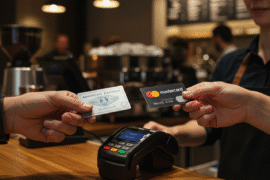This article may contain references to products or services from one or more of our advertisers or partners. We may receive compensation when you click on links to those products or services. Nonetheless, our opinions are our own.
Social media is now more than a communication and entertainment channel! You upload your vacation pictures, go live from concerts, share reels with friends, and post GRWM videos. Social media is all about fun and happy moments, right?
No!
Your updates on these channels also contribute to your social credit score. Let’s understand how your digital footprint impacts credit scoring.
A social media credit score helps lenders determine if you’re trustworthy with loans based on your online activities on Facebook, LinkedIn, Google, Instagram, and X ( formerly Twitter). This rating system measures your “social trustworthiness” and online behavior, unlike the regular credit score.
It reveals your lifestyle and reputation as a consumer. For example, your stable job profile on LinkedIn will boost your chances of getting loan approval.
Also known as alternative data, it’s an extra step to gauge your creditworthiness. The assessment isn’t about knowing how much you earn but about understanding your financial capability. This evaluation practice helps lenders, banks, and financial institutes identify fraudsters before lending money.
Simply put, assessing social profiles allows lenders to understand whether or not they’ll repay a loan.
How Does it Work?
Credit agencies use algorithms, computations, and data mining techniques to analyze a person’s online usage patterns to assess social media credit scores.
Political scientist Rob Aitken asserted in a research paper that “all data is credit data.” He says alternative credit scoring tracks online behavior, payment traces, and psychological inclinations to verify someone’s trustworthiness. Thus, this process helps to evaluate
- User identity
- Online activities
- Spending patterns
- Smartphone metadata
- Social media connections
- e-commerce merchant rating
- Payment or non-payment habits
This in-depth insight into a person’s spending habits and behavioral history helps creditors establish optimal lending rates and avoid risks.
Social media credit scoring isn’t about making rash decisions based on your online activities. Instead, lenders want to know that you are who you say you are. So, here are the key factors they usually check.
A first red flag that will impose you as a fraudster who plans to default on a loan and avoid leaving a digital trail. Thus, no social media account can be suspicious, lowering your credit score.
Next, your social media posts mirror your thought process. Where you go, what you eat, and what you do all contribute to your social profile credibility. So, social media accounts showing your unbalanced lifestyle will be unhealthy for your credit score.
For example, playing on fishy online casinos and posting about it on your social accounts will put you in bad records. Instead, choose the best poker sites for US players with market credibility to create a positive impression on creditors. Similarly, your score takes a hit with constant online fights and trolling.
Online Connections
Creditors will also assess who’s in your network and how you engage with them. Being friends with individuals with poor credit scores will affect your loan application. Financial institutes assume if your network is financially irresponsible, you’re too.
Data Discrepancy
People lie left, right, and center on social media platforms. Since not everything on someone’s profile is true, it leads to data discrepancy. Creditors may reject your credit request if the information on the application doesn’t match your social profile details.
Regularly analyzing a person’s social proof raises serious concerns about privacy. Not all customers will want financial companies to access and track their online data without consent. This evaluation process also raises big questions about the data and privacy terms of social media platforms.
Moreover, no established standards and regulations exist against collecting social data without user consent for loan approvals. This practice also remains controversial due to potential social control implications. For instance, criticizing the government online can lower the social credit score and limit access to loans for citizens in China.
On the other hand, data inaccuracy online will make it challenging for lenders to trust someone’s social history before loan application approval.
Check out the best practices to build a clean social profile and improve your credit rate.
- No red flags should be present on any of your social media accounts. Keep all the social profiles clean, as the lender will screen all the channels.
- Credit agencies don’t appreciate aggressive online behavior and offensive posts. Avoid this socially irresponsible behavior at all costs. Plus, delete posts that will negatively impact your social profile screening.
- Accept your connection requests wisely. That said, don’t accept or send friend requests to unknown people.
- Add correct professional and employment details to build trust in the eyes of creditors, especially if your traditional credit score is poor.
- As an entrepreneur, you should ensure that your brand gets good online reviews. A positive online reputation makes getting a business loan much more effortless.
FAQs
- What is a good credit score?
A good credit score will be 660 or more. However, it varies based on various data and calculation factors.
- Who invented the social credit score rating system?
The government of the People’s Republic of China started social credit scoring to track and evaluate citizens, businesses, and government institutions for trustworthiness.
Final Thoughts
Lenders can evaluate everything about you via your social media account, from your family, friends, and job to your whereabouts. Through this social media credit scoring, financial institutions want to verify that you’re a good person—someone they can trust and lend money to with an assurance that they will pay back.
Although controversial, this alternative credit score system boosts options for unbanked or underbanked people.

Reviewed and edited by Albert Fang.
See a typo or want to suggest an edit/revision to the content? Use the contact us form to provide feedback.
At FangWallet, we value editorial integrity and open collaboration in curating quality content for readers to enjoy. Much appreciated for the assist.
Did you like our article and find it insightful? We encourage sharing the article link with family and friends to benefit as well - better yet, sharing on social media. Thank you for the support! 🍉
Article Title: Does Social Media Affect Your Credit Score?
https://fangwallet.com/2025/02/27/does-social-media-affect-your-credit-score/The FangWallet Promise
FangWallet is an editorially independent resource - founded on breaking down challenging financial concepts for anyone to understand since 2014. While we adhere to editorial integrity, note that this post may contain references to products from our partners.
The FangWallet promise is always to have your best interest in mind and be transparent and honest about the financial picture.
Become an Insider

Subscribe to get a free daily budget planner printable to help get your money on track!
Make passive money the right way. No spam.
Editorial Disclaimer: The editorial content on this page is not provided by any of the companies mentioned. The opinions expressed here are the author's alone.
The content of this website is for informational purposes only and does not represent investment advice, or an offer or solicitation to buy or sell any security, investment, or product. Investors are encouraged to do their own due diligence, and, if necessary, consult professional advising before making any investment decisions. Investing involves a high degree of risk, and financial losses may occur including the potential loss of principal.
Source Citation References:
+ Inspo












































